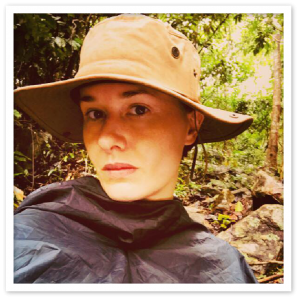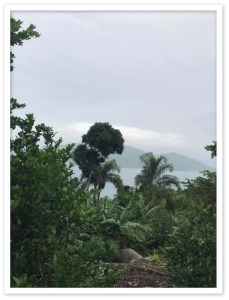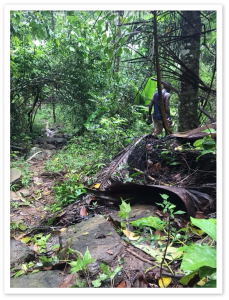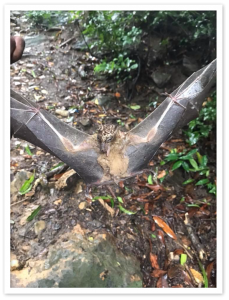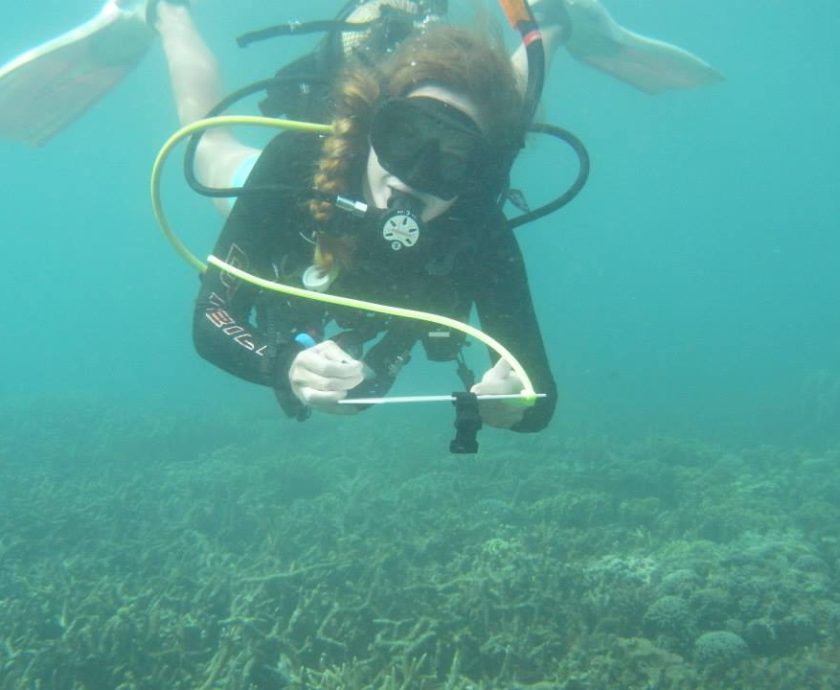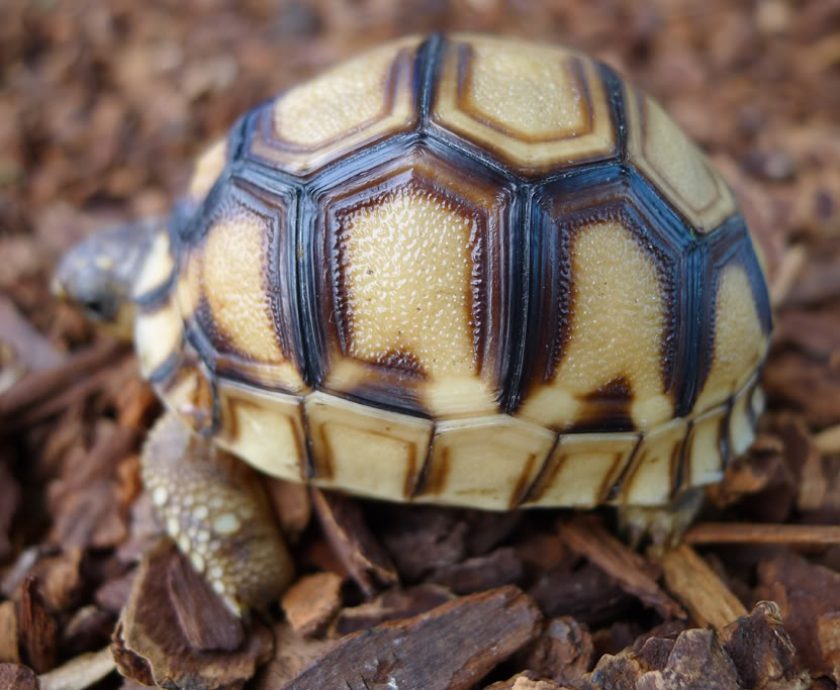Author: Roxanne Parker
Forest Conservation in Cyclone Season
As I wait it an airport for my final fight I wanted to write about my best bit over the 5 weeks volunteering. As I had little electricity on the island I don’t have many photos so I have to just write what I saw.
It’s had been Monsoon season and the rains had been relentless for 10 days. The bridge connecting Turtle cove, the small beach by our camp where boats could dock with food & supplies had been washed away in the night as the island was hit by a cyclone and the main port in Hellsville on Nosy Be had been closed for four days making it impossible to get supplies to the island. New volunteers had been stuck in Hellsville for days and arrived with soaked back packs as their boat from Ankefi to Hellsville had started to sink in the storm, and they had to transfer to a rescue boat.
The red earth of Nosy Komba ran down the hills like streaks of tears mixing with run-off rain water creating endless streams and rivers that zig-zagged across the island. We’d left camp at 6.30am. I was the last female volunteer left in the forest conservation project that week (in fact I was the only forest volunteer left on camp that week!) and Menja, one of the Malagasy forest guides & I had set out to survey wild lemurs for the morning. The mud is all enveloping. No matter how I try within minutes I’m filthy, with thick mud stains coating my trousers. The Malagasy woman have mastered the art of navigating the island while remaining spotless, emerging from reed huts like queens, in immaculate dresses & drop earrings but I look like I’ve taken a mud bath as soon as I leave camp! The humidity is over-powering. I sweat in my raincoat & it’s a toss-up between getting soaked to the skin or stewing in my own sweat. I choose the later and feel like a boil in the bag dinner as we assent the island.
The hikes to the top of the island are a sheer incline scrambling over the slippery red mud, rocks and fallen banana trees as we weave in & out of the plantations. “Malagasy Ice” Menja laughs wickedly pointing at the lethal red slippery mud slide that has enveloped the path ahead. I laugh, it’s all I can do as I try to keep up with Menja’s fast pace. Nimbly he leaps across rocks, runs through the mud & volts over logs with such speed and ability despite the rain and my sweat it’s hard not to be impressed by his agility. I’ve seen him do this walk bare foot as I slip behind him in my professional hiking boots! “this is my beach” he grins flashing immaculate white teeth & stretches out his arms surveying the forest around him. There’s not much left, it’s mainly secondary forest and plantations with glimmers of primary rainforest and a suggestion of the majesty of what Nosy Komba’s rainforest used to be.
A view across the ocean reveals near-by Lokobe, a protected national park and the last of the primary coastal rainforest in the region which seems to taunt the island of Komba like a better-looking sister displaying her crowning glory of green leafy canopy which homes some the worlds strangest & rarest plants & reptiles, compared to Komba’s scrubby plantation clearings. Here old growth trees were mainly saved from being logged & cleared because they were thought to be sacred trees & the Malagasy people are deeply superstitious. It would be a “Faddy”
A taboo, to cut such a tree. The villagers have many Faddys which vary from community to community & it would be impossible as a westerner to know them all as they differ between family’s and some are a faddy to tell their faddy! As we scale the incline I find a dead bat his body curled up and his tongue almost comically protruding from his mouth in one final theatrical act of surrender. Menja picks him up holding him out while stretching his wings to full capacity so he looks like a menacing specter. We climb on the incline getting steeper & the rains heavier. Just as I’m thinking I don’t know how much more I can take an elderly Malagasy couple saunter barefoot through the forest, both possibly in their 80’s. She carries an enormous sack of rice on her head with perfect posture while he balances a pole across his shoulders laden with heavy bunches of bananas. They flash me toothless smiles and a local greeting and proceed like a pair of adolescents down the hill.
I am suitably shamed and utter no words of complaint on any hike ever again! The forest is getting older and denser and Menja dances ahead of me through the trees his dark poncho flapping around him reminding me of the bat we’d found earlier. Suddenly he stops “smells bad” he decrees. I can’t smell anything but he steers a sharp left through the woods and points at the tree canopy “Maki” he exclaims and right enough swinging from tree to tree to a sizeable troop of black lemurs. The males with their impressive black shaggy collars of fur, the females with their demurer auburn coats. Menja had smelled them before he could see them! We get to work & I take a turn wearing the bat-poncho so I can hide under it to write the survey results. We record all their movements in five minute intervals with five minute breaks over the course of an hour.
The Maki (Lemurs) grunt contentedly like pigs over-head and I make notes as they watch us, noting numbers, sexes and if they are mature or juvenile as they travel from tree to tree, feed on their favourite jack fruit and sit companionably on tree branches grooming each other. We spot a juvenile being cuddled by his mother. The only disturbance is when a village dog barks in earshot of the Maki and they howl their protest noisily from the canopy warning the troop of potential danger. As they settle down I have an overwhelming sense of peace. The rain is running the ink of my survey and I know I’ll have re-write it when I return to camp but it doesn’t matter. None of it matters only this moment, here in the forest with the Maki’s knowing that their ancestors have hung from these branches for more than 40 million years. I want them to always roam this forest, I want there to always be these forests. This frozen-in-time national history museum that drifted away from Africa & India leaving it isolated & housing the strangest and uniquely indigenous animals.
I know that 90% of these forests are gone but I want to focus on what’s left & on conserving that. The hour fly’s by and I’m sad to leave the Maki behind with their tell-tale long tails protruding through the leaves unveiling their whereabouts and their inquisitive wide eyes studying me. I know this moment is priceless. It’s been mine and I feel incredible privileged to experience it. Earlier Menja told me how the female Chameleon dies after she lays her eggs while the male will wait looking for the female on a high branch but if he doesn’t find her in a few days he jumps plummeting to a premature-death. “Like Romeo & Juliet!” I exclaim. This induced Menja into a fit of laughter and as I give Menja back the bat gown to wear he says “are you sure, I don’t want Juliet getting wet” he teases.
I look at him ruefully, clearly drenched to the skin and put back on my own rain coat. We descend through the glacier smooth red earth but I don’t fall, this time I find my balance.



